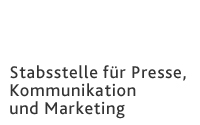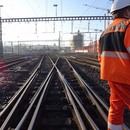Executive Department for
Press, Communication and Marketing
Adolf-Reichwein-Straße 2a Gebäude AVZ (Gebäudeteil AR-NA) 57068 Siegen
Phone: +49 (0)271/740-4915 Fax.: +49 (0)271/740-4911 E-Mail: presse@uni-siegen.de
Tracking Down Delays
Researchers at the University of Siegen are investigating in a research project how passengers and public transport companies each deal with malfunctions and cancellations.
"Attention please. The regional train to Siegen is expected to arrive with ten minutes’ delay ... ". Who never heard announcements like these? Especially at peak times, at the beginning of the holiday, or during rush hour traffic, delays, downtimes or disruptions to public transport appear to be almost normal and part of everyday life. Researchers at the University of Siegen are investigating the infrastructure of public transport companies in order to reveal the what goes on behind disruptions or cancellations. The project "Normal Operating Failures. Structure and Change of Infrastructure in the Civil Service "is part of the Collaborative Research Center" Media of Cooperation ". It is headed by Prof. dr. Jörg Potthast.
"The disruption of service reveals, what otherwise usually remains invisible - the work that is done behind the scenes by people in the public transport companies. When experiencing a disturbance, we first feel our expectations disappointed. We just expect the train or the bus to arrive on time, "explains project employee Dr. Ing. Tobias Röhl the background of the sociological research project. Malfunctions can have many causes, ranging from easy-to-repair, non-functioning incandescent lamps or signal systems to unexpected, unpredictable damage - such as emergency medical assistance on the track or storm damage.
Passengers wish rapid information
But how do passengers and public transport companies deal with such disruptions? In order to determine the perspective of the passengers, the Siegen scientists interviewed passengers from different social classes, ages and educational levels. Six groups of four to seven people each were selected. It turned out that the question of responsibility plays a central role for customers. "As a customer, you have the idea that someone should deal with a disruption quickly and effectively and explain the situation," says Röhl. Above all, passengers want quick information, at best with the mention of a plausible reason. Incidentally, passengers are less sympathetic to downtime due to an onset of winter, as this is perceived to be predictable, and not an "unplannable" weather condition.
Technicians as “Jacks of all Trade”
As part of the research project, the researchers also shed light on the perspective of public transport companies: How are work processes and responsibilities organized there? Over a period of several weeks, the team visited various public transport companies in Germany and abroad, both, small and large companies. One observation: the larger public transport operators have professional malfunction experts who are on standby around the clock. They have a pager, similar to employees of the fire department, and can be notified as needed. However, although these malfunction experts also deal with breaking news, they rarely face cases of life or death, like firefighters do. Nevertheless, the experts are required to choose their place of residence a maximum of half an hour's drive away from their workplace. In large companies, explains Röhl, a division of labor between different departments takes place during an incident. In smaller and urban businesses, on the other hand, technicians are often ‘jacks of all trades’: they are as much responsible for technical issues like broken doors, as they are for conducting sleeping or drunk passengers out into the fresh air. Also "external" problems, such as free-roaming dogs or the removal of vomit in bus and train, are among their tasks.
If a malfunction occurs, the duration of the delay caused is always of central importance. Thus, the performance of the maintenance technicians is measured by delay minutes. The 'guilt' question is answered differently by customers and companies, explains Röhl: "For passengers, the organization as a whole is always at fault, whenever there is a problem. On the other hand, the transport companies look closely at which department or which maintenance technician is responsible. "The managers blame the reasons for delays also on individual departments or certain persons. The unions, again, take an opposing view: they argue that it is not the performance of individuals that is crucial for the duration of delays, but the interaction between the staff and the departments.
Better understanding requirements and demands
According to which criteria do the participants assess disruptions in each case? The scientists intend to solve these questions using concrete cases. The wishes of the passengers and the requirements of the public transport companies are not always compatible in practice: Thus, the cancellation of a bus may cause individual passengers chagrin, but could, on the other hand, safeguard the operation of an entire network. Safety concerns must be reconciled with the desire for the quickest possible resolution of faults. The aim of the research project is to contribute to a better understanding of societal expectations of transport infrastructures and associated conflict lines. In 2018, the scientists are also planning a conference titled "On Time", which will deal with the timing of transport.
Background
The project is one of 16 subprojects of the Collaborative Research Center (SFB) "Media of Cooperation" at the University of Siegen. The SFB is funded by the Deutsche Forschungsgemeinschaft (DFG) and started at the beginning of 2016. More than 60 scientists explore interdisciplinary digital media and the societal changes that they cause.


